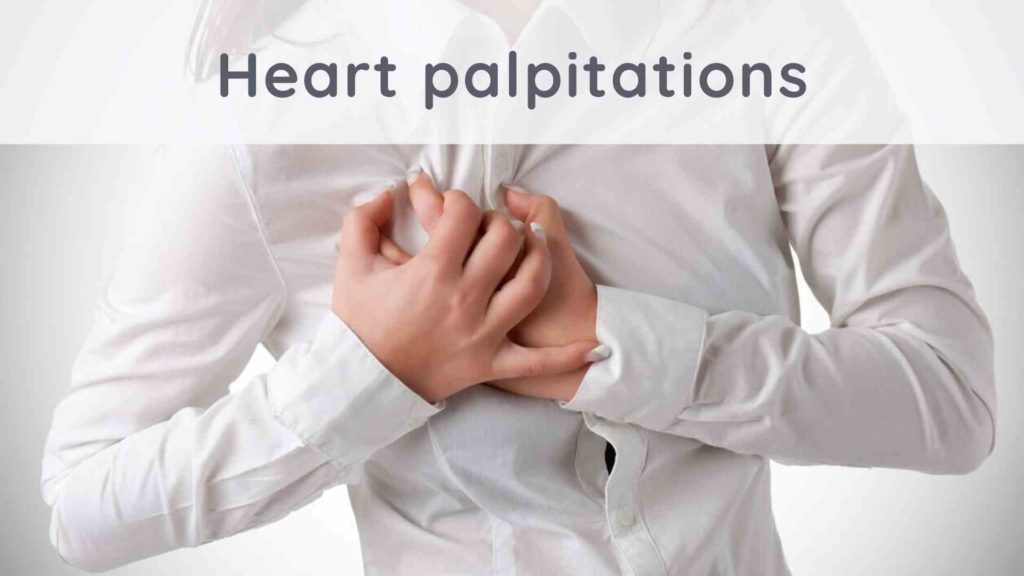Heart palpitations: how to calm your heart?
Written by: Loris Vitry (holistic coach)
Validated by: Cathy Maillot (Osteopath)
Caution: If you have any medical questions or concerns, please speak to your doctor. Even if the articles on this site are based on scientific studies, they do not replace professional medical advice, diagnosis or treatment.

Is your heart beating abnormally, or do you feel your heart rate go up often?
Do not neglect heart palpitations if they recur.
Often linked to particular emotions such as stress or anxiety, palpitations may be harmless when they don’t last.
What straightforward attitudes should you adopt to calm them down?
What natural solutions and foods should you favor?
Discover in this guide the proper reflexes to have to calm your heart.
Refrain from consuming caffeinated beverages
Caffeine is a stimulant that can trigger palpitations.
It is present in coffee or any other energy drink containing caffeine.
If you overindulge in coffee, tea, or cola-based stimulating drinks or chocolate, you increase the risk of triggering palpitations.
Also, avoid excess alcohol and tobacco, which can also be at fault.
If you feel palpitations after consuming a stimulant, drink enough water to remove the stimulant from your body.
Likewise, avoid smoking and drinking alcohol when you have palpitations as they are stimulants.
Soothe your heart with ylang-ylang essential oil
Ylang-ylang essential oil is used as a tranquilizer to treat certain diseases in aromatherapy.
It will help you regulate your blood pressure and fight stress and anxiety.
This essential oil does not require any medical prescription.
In the event of a palpitation panic, breathe in the essential oil of ylang-ylang to feel the soothing effect.
How to do?
Apply 1 drop to each of your wrists, then breathe deeply for a few minutes, as the palpitations subside.
Or use a handkerchief that you have inhibited by 2 drops of the essential oil and breathe in vigorously.
If you want to have a more lasting soothing effect, use the oil with a massage on the solar plexus as follows:
- Dilute 5 to 10 drops of essential oil in olive oil for example,
- apply the diluted solution to your solar plexus while massaging the area
Avoid using this massage method based on ylang-ylang essential oil if you suffer from hypotension or if you are pregnant but also if you are breast-feeding.
Drink a herbal tea made from hawthorn
The hawthorn plant is known for its calming effect and its ability to treat superficial heart conditions by regulating blood pressure and heart rate.
Its use in the treatment of cardiac disorders is linked to its action against nervousness.
If you feel palpitations due to stress, depression, or anxiety attack, take a hawthorn herbal tea to slow down.
Here is how to use it:
- put 1 to 2 teaspoons of dry hawthorn flowers in a cup of hot water,
- leave the infusion to stand for a few minutes, then filter the tea obtained, then consume your drink,
- repeat the operation 2 to 3 times a day during 6 weeks of treatment.
If, after treatment, the palpitations reappear, do not hesitate to consult your doctor-cardiologist for cardiac examinations.
Find your calm by sitting down and breathing deeply
If during a day, your heart rate increases irregularly, without you having made any particular effort, then ask yourself:
what is causing this increased heart rate?
If you have no previous cardiac history, and you are in such a situation, calm down first.
Take a breath and slow down.
Sit down and breathe calmly and deeply, making sure you fill the belly with each breath.
You will find a stable and regular heart rate after a few minutes of practicing slow and proper breathing.
You will feel relax, and you will be less prone to palpitations.
Practice a physical activity such as walking or cycling
To prevent cardiovascular disease, exercise regularly to help reduce blood pressure, and the number of stress hormones.
Practice moderate physical activity that will help you strengthen your heart.
You have several options such as: running, walking, cycling, or swimming.
But also opt for activities like weight training, which work tenacity and endurance.
Eat more fatty fish
Rich in omega 3, fatty fish such as salmon, sardines, or mackerel contributes to the proper functioning of your cardiovascular system.
They also reduce the risk of having a myocardial infarction.
Consult your cardiologist if the palpitations recur and are accompanied by other symptoms
Generally, heart palpitations without other symptoms are safe.
You will naturally feel them after an effort during the sport or if you undergo strong emotions.
However, if your heart is beating irregularly and quickly, and this is causing high anxiety, consult your cardiologist.
Your doctor will be able to help you by examining you more precisely to diagnose possible heart disease.
However, if your heart palpitations occur with other signs, make an appointment with your doctor immediately.
It can be dizziness, chest pain, feeling sick, breathing complications, or fainting.
It is recommended to avoid stress and moderate your consumption of tobacco and caffeine to calm your heart and avoid palpitations.
Some natural solutions like hawthorn can be used with or without a medical prescription.
Hawthorn regulates blood pressure and heart rate.
Physical activity and a diet rich in omega 3 are necessary to prevent palpitations.
If palpitations are caused by taking certain medications, make an appointment with your doctor to replace or adjust your therapy.
Finally, get examined by a doctor to diagnose a condition such as anemia or high blood pressure.
Continue reading:
Paranoia: how to get out of it?

